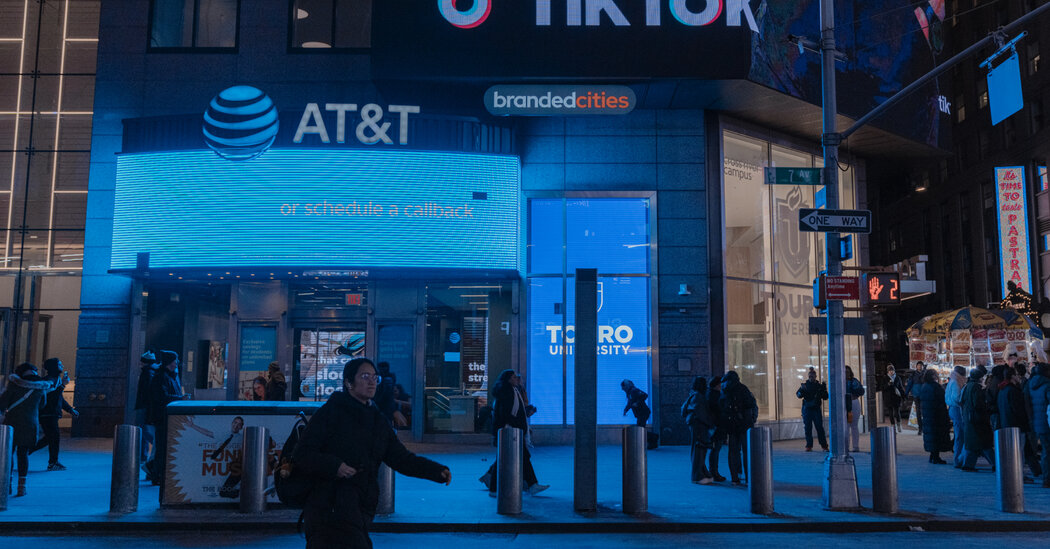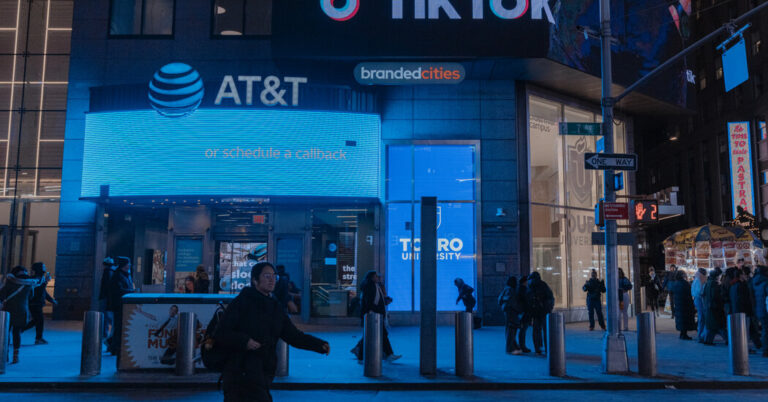On Friday, President Trump granted Tiktok another recovery by announcing that he would prolonged the deadline for when the popular app had to make an agreement to be separated from its Chinese owner, bytedance or face a ban in the United States.
Tiktok, who was facing a Saturday deadline for an agreement, now has another 75 days to find a new owner to conform to a federal law that requires to change his structure to solve national security problems. This places the new deadline for an agreement in mid -June.
The delay was the second of President Trump for Tiktok this year. First of all, paused the application of the law in January, even after it was unanimously confirmed by the Supreme Court.
“The agreement requires more work to ensure that all the necessary approvals are signed,” Trump wrote in a post on Truth Social on Friday, adding that “we do not want Tiktok to” do dark “. He added that he could not wait to” work with Tiktok and China “to close the agreement and suggested that he considers to use the app as a negotiation chip with China on rates.
Trump’s last action highlights the intractable nature of the dilemma with Tiktok, who has endured years of control in the United States for its Chinese bonds. Even when the legislators and the US officials repeatedly raised questions about the fact that Tiktok was sure, the app consolidated his role of cultural Juggernaut, with over 170 million users in the country who use it to make memes and share videos.
The extension is happening at a particularly framed moment in the US-China relationships. This week, Mr. Trump met a 34 % rate on the goods from China. On Friday, Beijing reacted with 34 percent rates through imports from the United States. Trump repeatedly suggested that he could lower Chinese rates as part of an agreement for the app, which will need the approval of the Chinese government.
The delay also renewed questions about Mr. Trump’s will to put his presidential power before the state of law. The federal law that aimed to change the property of Tiktok or that the app was prohibited was approved last year with a broad bipartisan support and had a effect in January after the Supreme Court sentence. But Mr. Trump actually canceled the law when he paused the application that month.
For now, one thing is certain: Tiktok will continue to operate in the United States for the near future. In January, the app became briefly dark in the period in which the federal law entered into force before trembling in life.
On Friday Bytedance recognized for the first time that he was involved in Tiktok negotiations with the United States government.
“There are key issues to be resolved,” said a bytedance spokesman in one and -mail. “Any agreement will be subject to approval pursuant to the Chinese law.”
The delay followed the thesis and last minute negotiations and a burst of interest by potential buyers. The law provides that no more than 20 percent of Tiktok or its mother -a -country company are owned by people or companies in the so -called foreign opposing countries, a list that includes China. To achieve this, Bytedance could sell Tiktok or bring new investors to reduce the percentage of Chinese investors, among other options.
Vice -president JD Vance, which Trump touched to help supervise the talks on the agreement, recently said that an agreement was imminent. Although Amazon has presented an offer to buy the entire company, most of the speculation in recent weeks has focused on an option in which the US investors existing in bytedance would have rolled on their posts in a new independent global Tiktok company and other US investors would have been brought. Private Equity Blackstone and Silver Lake companies had weighed by taking a participation in Tiktok, as well as the risk capital and Andreessen Horowitz capital company.
It is not clear whether that type of agreement would satisfy the law or politicians who pushed him.
Some were particularly worried about what could happen to the Tiktok algorithm field, which discovers what users like and populate a personalized feed for them. According to the law, a new entity Tiktok cannot collaborate with bytedance “as regards the functioning of an algorithm of content recommendation” or for sharing data.
“If this ends with an agreement in which the algorithm remains in Beijing, then everything is a scam, everything is a fraud,” said Senator Mark Warner, a democratic of Virginia. “The law is explicitly clear.”
A group of republican legislators in two chamber committees – one focused on China and competition and the other on energy and trade – declared on Friday in a declaration that “any resolution must guarantee that the US law will be followed and that the Chinese Communist Party has no access to American users’ data or the ability to manipulate the content consumed by the Americans”.
“We are committed to enforcing the framework established by the congress to safeguard the American people,” said the group, which included the representative John Moolenaar, Michigan Republican, who chairs the Committee for China.
The worries about Chinese ownership of Tiktok have been prepared for years. Officials and legislators of intelligence have argued that bytedance could deliver the sensitive data of US users to Beijing, such as information on the position, on the basis of laws that allow the Chinese government to secretly request data from Chinese companies and citizens for information collection operations. They also said that China could use the recommendations on Tiktok’s contents to feed disinformation, a concern that intensified in the United States after the start of the Israel-Hamas war and during the presidential elections.
Tiktok has long rejected Washington’s concerns and tried to face them without a sale. He said he had never used implicated data or disseminate propaganda at the behest of Beijing in the United States. But despite a safety effort from billions of dollars who tried to give the American government a single control of Tiktok’s operations, the company was unable to win Washington’s trust.
Lindsay Gorman, CEO of the technological program at the German Marshall Fund and a technological consultant under the Biden administration, said that the support of the Trump administration for the app was a victory for China.
“This is the purest victory out there – that a democratic country that should be a nation of laws is refusing to enforce it on the pressure of a foreign government and its business intermediaries,” he said.
The law prevents technological companies from distributing or updating Tiktok under the threat of serious financial sanctions. Apple and Google removed Tiktok from their App Stores for almost a month until they received insurance from the Department of Justice that would have had to face fines for the transport of Tiktok in the shops.
Legislators suggested that these companies could face the shareholders’ legal actions in the future, if they continue to distribute and host Tiktok in the United States under the current administration.
Akamai Technologies, a company based in Massachusetts that helps to provide Tiktok videos to telephones, has recently updated risk factors in its annual deposit to note that “even if President Trump has extended the expiry of application for a ban on Chinese demand, there is no certainty that we will not be exposed to responsibility”.
David McCabe has contributed to reports from Washington.





